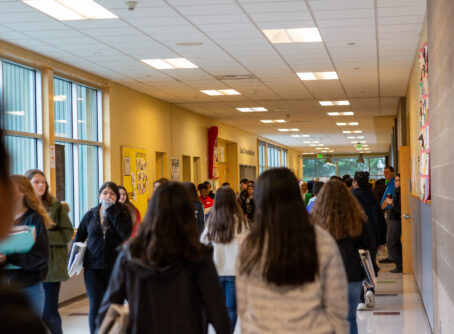
This interview is a part of Shared Justice’s Series, Voices of Youth Diversion. This series looks at ways that community organizations, in partnership with state and local governments, are working together to rehabilitate youth and reduce the harmful impacts of youth interaction with the justice system.
EF: Would you share a little bit about yourself and your story?
DR. PERRYMAN: I was born and raised in Toledo, Ohio, and I was a very active member of the Faith community. The church has been a big part of my life. Not just as a person of faith, but also being intentional about the type of congregations we were involved in. We looked for churches that were in distressed neighborhoods and had need. When I was young, my parents said they just wanted us to be grounded in our points of view, and to use worship as a vehicle for service – giving back and having a broader awareness of the experiences of people who might be a bit different from me. I was born into multiple generations with the same philosophy and same values, all under the umbrella of faith.
EF: How did you get involved with the youth diversion work you do at Center of Hope?
DR. PERRYMAN: When I was a freshman in college, my parents founded Center of Hope Church. One of the first things we tackled as a new congregation was the issue of criminal justice. Individuals in the congregation, or children of the individuals in our congregation, found themselves involved with the juvenile justice system or the criminal justice system. They often did not have the money for proper representation. Oftentimes, they were not versed in how to communicate in that space, or how to advocate for themselves. Many times, they did not know what information was valuable to their attorneys.
We worked with our congregants, their families and communities to gather critical information that could make the difference between diversion and incarceration.
During that time a family member of mine ended up in the justice system who never had any kind of record. He was well educated and never showed any tendency of criminogenic behavior. One of the problems was that the issue happened in an area that was not very progressive. His attorney said, “Based upon where this happened, it really doesn’t matter what the evidence says. There probably will be a conviction and there will probably be a long sentence.” That was when I first saw how families can be coerced into taking deals that result in incarceration without a full picture of potential options. I also learned from the residual effects of incarceration on people and their families. Systems do not have proper supports in place for returning citizens.
All of that experience influences my work as the CEO of Center of Hope. It gave me a strong sensitivity to individuals who have been involved in the justice system. It gave a strong sensitivity to how they are treated and perceived. They are often deemed un-loveable, unreachable and unteachable.
As a non-profit, we started working with court systems through child support enforcement. We served who were incarcerated, or at risk of incarceration, for not paying their child support. We saw the cyclic effects, because while they’re incarcerated, they cannot earn any income. And without income, they are unable to make payments. Their arrears would continue to grow, which would perpetuate the problem.
Our first project was diverting individuals from incarceration for child support by helping them land jobs, set reasonable payment plans with court systems, and file for joint custody to parent in an even greater way. We emphasized to fathers that it’s not just about money, but it’s also about the time you spend with your children Later, we received the opportunity to work with Lucas County Juvenile Court on juvenile justice diversion programs by supporting families. Our role was to equip families with supports that can reduce the chances of children being court involved in the first place. We took the program a step farther through equipping parents to work more effectively with their children who were not yet court involved. We helped parents work on early intervention strategies for their younger children in order to break the cycle.
EF: You already mentioned some of the services Center of Hope provides for low wealth and marginalized children and adults, but now that your organization has grown, what are some additional programs you have for youth?
DR. PERRYMAN: Center of Hope has a state award-winning after school program called Elevate, where we provide high quality, comprehensive after school services to children in three school districts: Toledo Public Schools, Washington local schools, and Sylvania Public Schools. Monday through Friday, seven months a year, we provide tutoring, recreation, meals, and a high quality visual and performing arts element. Students take electives, such as dance, theater, and visual arts, and provide bi-annual showcases for the community. To combine reading with social emotional development, I wrote an Elevate curriculum, offering themes that tie reading to their everyday lives. The curriculum concurrently teaches social-emotional skills while building reading skills.
For adults, the Family Navigator Program supports parents of court involved youth and parents who have been in contact with the either the youth justice or child welfare systems. We help them learn the court terminology and walk through that system more effectively, uncovering barriers to their success (meaning zero involvement with either system). We help connect families with the resources that they need. We’re also a neutral ear. We help them bounce ideas and mentor them on how to communicate with the court.
We also share themes that we learn and hear from families with the court system to help them advance their race equity work. If there are systemic policies/practices increase chances of incarceration in the absence of criminogenic risk, then we point out those issues. As I mentioned, we help adults secure employment to avoid child support issues, and provide parenting support group classes. Parents are free to talk about their parenting issues. We use an evidence based model to help them formulate solutions. Every four weeks we take a break and we provide cooking classes for parents, to help them prepare a family sized meal to enjoy with their children.
EF: Looking through the website, I noticed that one of Center of Hope’s goals is to offer culturally relevant services. Why are culturally relevant services an important part of the work that you do? What kind of recommendations might you have for organizations similar to Center for Hope that may have not figured out how to provide those services yet?
DR. PERRYMAN: The services must follow the needs and the worldviews of the children and families we serve. It is very important to become immersed in the culture of the individuals that we serve. We must integrate intentional protocols that allow to hear their thoughts on how well we’re hitting the mark. I consult with community groups, agencies, foundations and governments on how to develop intentional, responsive strategies for culturally relevant engagement. I lead them in answering questions like how do you approach those groups that are different from you? How do you bring the targeted group of interest to the table? How do you incentivize their participation? Then, how do you ask respectful questions? How do you make them feel that their input is actually valued?
There’s a lot of research out there on how you can engage and serve different groups based on race, ethnicity and socioeconomic status. But once you do the research, you still have to figure out how to match the research with the individuals you are serving or want to serve. This was one of the issues that we continuously raised when we started the Family Navigator Program. Within the court system, there was the thought, “There are other models. Why can’t you just take the model and duplicate it here in Lucas County?” I had to explain that there are cultural differences by region. Where we are situated in the United States also matters. Models must be tailored to the specific region, community, and population of interest.
EF: Thank you. This is helpful for us to think about your youth diversion programs to think about how we can implement those programs where we are.
DR. PERRYMAN: Within the work of family engagement, there was a prevailing thought that systems or organizations could focus on family engagement without first considering community engagement. We help organizations and systems build a family engagement model with community engagement at the center of our priorities. Families and youth should spend more time in their communities than working with us and the justice system.
Many times, systems think that they can relate to families and children all on their own. I challenge that assertion through illustrating how we edit our conversations with our supervisors due to potential consequences. Families and youth have the same concerns, because courts have power over their life outcomes.
I lead organizations and systems in identifying credible messengers in the community first. Then we conduct a systematic and intentional analysis of the supports that help children and families experience positive life outcomes. Next, I walk them through how to survey families to find out their perceptions about those needs, what kind of partners they want to work with. From there, we set priorities and figure out how to monitor continuous improvement.
EF: What would you say makes Center of Hope’s programs unique and successful?
DR. PERRYMAN:
We take the deep dive into planning and implementing any initiative provided by Center of Hope. We don’t just take a model that has worked and drop it into our service delivery model. We consider what happens outside of our programs because our families and children do not live in a vacuum. We can talk about cognitive based interventions until the next century, but without having a strong understanding of the communities that our children and families come from and the values of those communities, it is difficult to develop and implement programs that are practical or reasonable. If the programs are not practical or reasonable to the children and families, they will not participate. And no meaningful, positive changes will occur.
I always say if we love children and families, then there should be some evidence of it. We built a comprehensive tracking mechanism for our family engagement initiatives. We track the type of services families are receiving, and their perceptions of those programs and services. We carefully analyze successes that we can amplify and replicate, as well as the challenges that we need to adjust. I am not happy or satisfied if I don’t see families and children excited about participating in our programs. When they’re excited, they have expectancy. Where they have expectancy, they have hope. Where they have hope, they will do the work and empower themselves.
EF: How have you seen youth involvement with the justice system impact the lives of youth and their families?
DR. PERRYMAN: Youth involvement in the justice system devastates families. Without sufficient diversion and resources, justice involvement can send a child on a path that does not lead to positive life outcomes overall. For the families, it is devastating and embarrassing. It is also devastating for the community. Oftentimes we see overrepresentation of particular races, ethnicities, and youth from certain neighborhoods in the justice system. Every time a child from a specific racial or ethnic group, or a particular neighborhood is involved in the justice system, it can cause those left behind to devalue where they come from and to devalue who they are. To those left behind, it seems like another statistic that represents them in less than favorable light, and it can diminish their hope.
Without sufficient diversion and resources, justice involvement can send a child on a path that does not lead to positive life outcomes overall.
Diversion programs are extremely important. As organizations and communities build these programs out, it is important to address root causes. When we take the deep dive into root causes, we can build meaningful programs that truly reduce recidivism. We can move forward hopeful, because there are already national models/examples that work.
EF: How do you think Christian 20- and 30-somethings can support children and families impacted by youth probation or involvement with the justice system?
DR. PERRYMAN: I began my work with the justice system when I was 20 years old. As 20-30 somethings seek to become involved, remember that youth on probation have a myriad of needs. Tutors to assist with educational gaps would be extremely helpful. Education and mentoring services to their younger siblings would also be very helpful. Donations and contributions to the youth and their families are helpful as well. Finally, find out what your local court system is doing. There may be vehicles already in place to amplify that work or to accelerate it.
Dr. Perryman is the Executive Director and co-founder of Center of Hope Family Services, whose mission is to improve the life outcomes of individuals and families living in urban settings.
WANT TO GET INVOLVED?
1. Sign up to receive Shared Justice’s monthly newsletter and stay up to date on the latest content, resources, and highlights.
2. Write for us! To learn more about writing for Shared Justice, email emily.fromke@cpjustice.org.
3. Form a Political Discipleship group to practice meaningful political engagement in your community. The Center for Public Justice’s Political Discipleship is a guide for active Christian citizenship, designed to empower people with skills and tools to shape policy and address inequality and injustice in their communities. To learn more about starting a group, visit our website or contact emily.fromke@cpjustice.org






